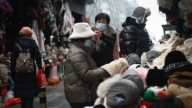【新唐人2013年09月14日讯】自英国制药企业“葛兰素史克”涉嫌商业行贿事件爆发后,中共当局开展了一系列针对外国企业行贿情况的调查,对此,在大陆的欧盟商会表示,中共当局的监管部门对外企的调查不公平,而且是有选择性的。欧盟商会呼吁当局能在调查的程序上做到透明公开,对本国的企业和外企采取一视同仁的平等态度。
据《自由亚洲电台》引述9月5号《美联社》的报导,近段时间以来,大陆监管机构除了对“葛兰素史克”和“赛诺菲”在内的多家外国医药公司,展开了贿赂调查外,还因价格垄断问题对多家国外乳制品企业,作出巨额罚款。对此,代表了1700家欧盟驻华企业利益的最大组织——中国欧盟商会,对中共当局针对外企进行的调查举动提出了异议。
《美联社》引述中国欧盟商会主席大卫-库奇诺 (Davide Cucino) 的观点认为,中共当局针对外国企业进行的这些贿赂和所谓反垄断价格调查,是不公平的、有选择性的。而且大陆媒体在针对中国和外企的腐败问题时,也没能够不偏不倚的报导。
北京天则经济研究所副所长冯兴元:“它对国企对外的行贿或者对内的,它的披露一直没有。”
大陆企业观察员何军樵:“中国那么多的垄断企业,比如说中国的央企,他们基本上都是靠垄断起家的、也是靠垄断生存的,中国老百姓早就希望政府用反垄断法来制裁他们,但是一直都没有这样做,因为垄断企业掌握在利益集团的权贵手上,所以对于个别外国企业实施反垄断法的制裁,这是完全有选择性的,其背后应该是有政治的问题。”
国际反腐组织对于中共当局只问罪行贿的外企,不追责受贿的官员,这种选择性的做法,也表示了谴责。
冯兴元:“如果要惩处外企的行贿行为必然有受贿的行为,要公正透明的报导,你既然有这个行为就事情全报导,及时反应全面的情况,让大家知道到底谁拿钱了,是自己全花了还是再转送给哪一个政府的领导。”
《路透社》9月5号引述中国欧盟商会制药业工作组主席Bruno Gensburger的话说,受调查的外国公司都有全球化的标准作业程序(SOPs),他们在华行为普遍是守法负责的。这一观点得到了中外企业家和经济学者的共识。
何军樵:“总体来讲,几十年以来外资企业在中国基本上是非常守法的,它们不仅仅是在企业管理给中国做出了巨大的贡献。也给中国经济的增长做出了巨大的贡献,至于个别企业可能有某种违法的事情,它的严重程度和它的普遍性、后果都远远比不上中国企业在违法乱纪方面的后果。”
欧盟商会主席大卫•库奇诺指出,有些在华的外国企业可能的确存在一些腐败现象,但欧盟企业希望中国监管机构,在处理这些腐败问题时能够依法行事。
何军樵:“中国目前的问题在于执法者不守法,所以一个不守法的政府,拿起法律的大棒去制裁别人,首先就不能够服众。而且个别在华企业轻微的违法乱纪行为,也根本没有代表性、没有说服力。”
舆论认为,外国企业纷纷陷入商业贿赂危机的主要原因,是大陆根深蒂固的贿赂文化,与腐败的商业环境,令他们不得不入乡随俗。
冯兴元:“外企到国内在行贿,很大一部分它有制度原因,就跟民企向政府输送利益是一样的,都是因为政府权力太大,有些官僚繁文缛节比较多,如果要获得一个项目批准,需要很多程序,中国也不是法治国家,那为什么外企在国外不需要自己国家行贿,到你们中国来就不得不行贿。”
大部分的舆论认为,大陆官员的权力寻租、行政性垄断资源过多、政府过度干预市场、法律监管不到位等等因素,正在倒逼本来以技术研发与服务提升为主要职责的外国企业,不得不将视线转移到对所谓行政部门和官员的贿赂上来。
采访编辑/张天宇 后制/王明宇
Bribery Investigations in China: Foreign Companies Discriminated Against
Since allegations of commercial bribery were
brought against British company GlaxoSmithKline
(GSK) in China, the authorities have begun
investigating corruption in foreign companies.
The European Union Chamber of Commerce
(EUCC) in China commented on this issue.
The investigation into foreign companies hasn’t been
conducted in a balanced way, and has been selective.
The EUCC urged China to be
transparent during the investigation.
The domestic and foreign companies should be equal.
On September 5, Radio Free Asia cited Associated Press (AP).
Recently, Mainland China regulators carried out investigations
for possible bribery in several pharmaceutical companies.
This includes GSK and Sanofi. In addition, several foreign
dairy companies were heavily fined for “monopolizing prices".
The EUCC in China, which represents
1,700 foreign companies, raised concerns.
AP cited Davide Cucino, President of EUCC in China.
Foreign companies believe they are being unfairly singled
out for scrutiny under bribery and pricing investigations.
Cucino said foreign companies also believe
accusations against them receive more prominent
publicity from Chinese state-controlled media.
Feng Xingyuan, Deputy Director,
Beijing Unirule Institute of Economics:
“The authorities had never revealed how state-owned
enterprises bribe, both internally and externally.
It has never been mentioned."
He Junqiao, business expert in China:
“There are many company monopolies in China.
This includes state-owned companies making
fortunes from monopolies, and existing on them.
Chinese people always hope that the authorities carry
out anti-monopoly actions, to punish these companies.
However, it has never happened.
This is because the monopolising companies
are controlled by interest groups.
Investigation into foreign companies is therefore
selective, as it likely has political motive behind it."
The international anti-corruption organization condemned
the CCP for singling out foreign companies’ bribery.
This is because it didn’t investigate who accepted bribes.
Feng Xingyuan: “To punish foreign companies’ bribery,
acts there must have someone receiving the bribes.
The report should be transparent. The entire issue
needs to be completely reported in a timely fashion.
Let everyone know who accepted bribes.
Did he spend it on himself or has it been
given to any governmental official?"
On September 5, Reuters cited Bruno Gensburger, Chair
of the EUCC in China’s pharmaceutical working group.
The foreign companies that have been investigated
all have global standard operating procedures (SOPs).
They are by enlarge very responsible in their China practice.
Economist from home and abroad agree with Gensburger.
He Junqiao: “Generally, in the past few decades,
foreign companies have been law-abiding in China.
They not only had made tremendous contributions
to business management in China, but also made
great contributions to China’s economic growth.
Maybe individual companies have done something
illegal, but the severity, universality and results are
far less than Chinese companies have brought."
Davide Cucino said that foreign companies
in China may have these cases of corruption.
European companies would be satisfied
if the cases are handled according to law.
He Junjiao: “The problem in China is the
law enforcers do not abide by the law.
Thus, a non law-abiding regime, which uses rule
by law to punish others, is first of all not convincing.
Some individual foreign companies have
minor infractions, but this is not representative."
Public opinion believes foreign companies
have plunged into “commercial bribery".
The main reason is the CCP is deeply-rooted in
a “bribe culture" and corrupt business environment.
They had to “do as the Romans do".
Feng Xingyuan: “Foreign companies bribing
in China is caused by the CCP regime system.
It is just like private companies giving
away their interests to the government.
This is because the government has
too much power and bureaucracy.
If you want to get a project approved,
it requires many procedures.
The Chinese regime isn’t governed by laws.
Why is it that foreign companies don’t need to
bribe in their own countries, but have to in China?"
The majority of public opinion believes Chinese
officials abuse power, and monopolize resources.
The government excessively intervenes in the market,
and legal regulations couldn’t be implemented.
Foreign companies that are being bankrupted, and who had
considered technology development and improving services
as their main duties, have to bribe governmental officials.



























